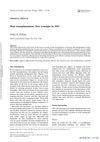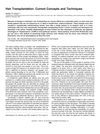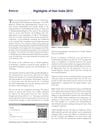 9 citations,
January 2005 in “Journal of Cosmetic and Laser Therapy”
9 citations,
January 2005 in “Journal of Cosmetic and Laser Therapy” In 2005, hair transplants looked natural and worked best with realistic goals, medication to preserve hair, and depended on the amount of donor hair.
 15 citations,
January 2002 in “Gynecological endocrinology”
15 citations,
January 2002 in “Gynecological endocrinology” Hormones affect skin aging and fat distribution, and treatments can help, but only minoxidil is proven for female hair loss.
[object Object]  30 citations,
October 2005 in “Journal of Investigative Dermatology Symposium Proceedings”
30 citations,
October 2005 in “Journal of Investigative Dermatology Symposium Proceedings” The document concludes that hair transplantation is recommended for those not helped by medical treatments, but warns that high-density transplants may lower hair survival rates.
 69 citations,
March 1993 in “Archives of Dermatology”
69 citations,
March 1993 in “Archives of Dermatology” The document says there are five types of hair loss conditions and different causes, including drugs.
 19 citations,
April 2020 in “Dermatologic Therapy”
19 citations,
April 2020 in “Dermatologic Therapy” Dutasteride works better than finasteride for hair loss, with both being safe to use.
 February 2020 in “Scholars international journal of traditional and complementary medicine”
February 2020 in “Scholars international journal of traditional and complementary medicine” Ayurveda treats hair problems like hair loss and dandruff by balancing body elements and using natural remedies like Indian Gooseberry and false Daisy.
 49 citations,
December 2009 in “Journal of Investigative Dermatology”
49 citations,
December 2009 in “Journal of Investigative Dermatology” Thyroid function affects skin health, with a complex interaction between the two.
 11 citations,
March 2021 in “Dermatology and therapy”
11 citations,
March 2021 in “Dermatology and therapy” Researchers created a new tool to measure the effects of alopecia areata from the patient's view, focusing on hair loss, daily life, and emotional health.
 1 citations,
January 2012 in “International Journal of Trichology”
1 citations,
January 2012 in “International Journal of Trichology” Hair India 2012 was a successful international event focused on combating fake trichology practices and discussing various hair health topics.
 January 1990 in “Springer eBooks”
January 1990 in “Springer eBooks” The document talks about three main surgical treatments for hair loss: punch hair transplantation, alopecia reduction, and flap hair transplantation.
 3 citations,
April 2019 in “Clinical Therapeutics”
3 citations,
April 2019 in “Clinical Therapeutics” Computational tools identified 29 drugs that could potentially target 19 genes involved in chemotherapy-induced hair loss, which could lead to more effective treatments.
 14 citations,
September 2016 in “Journal of Cutaneous Pathology”
14 citations,
September 2016 in “Journal of Cutaneous Pathology” The document concludes that new methods improve the accuracy of diagnosing scalp alopecia and challenges the old way of classifying it.
 August 2023 in “International journal of research in Ayurveda and pharmacy”
August 2023 in “International journal of research in Ayurveda and pharmacy” Ayurveda can prevent hair fall and promote regrowth using herbs and lifestyle changes.
82 citations,
May 2010 in “PLoS neglected tropical diseases” Secondary syphilis in Cali, Colombia, shows high Treponema pallidum presence and challenges in early diagnosis, needing better public health strategies.
 1 citations,
August 2017 in “Semiotica”
1 citations,
August 2017 in “Semiotica” The paper concludes that breast cancer treatment involves complex interactions between medical symptoms, patient experiences, and commercial influences, requiring a holistic approach.
 January 2022 in “International journal of research in medical sciences and technology”
January 2022 in “International journal of research in medical sciences and technology” Ayurveda offers a safer and effective way to manage Seborrheic dermatitis without severe side effects.
 3 citations,
May 2011 in “Medical Hypotheses”
3 citations,
May 2011 in “Medical Hypotheses” Transnasal cooling could reveal new insights into various physiological conditions and may be a natural way to transfer heat from the brain.
 March 2019 in “Dermatologic Clinics”
March 2019 in “Dermatologic Clinics” The document concludes that there have been significant advances in the treatment and diagnosis of various skin conditions.
 1 citations,
August 2013 in “Springer eBooks”
1 citations,
August 2013 in “Springer eBooks” Birth control pills and anti-androgen medications help manage hair growth, acne, and hair loss in women with PCOS.
[object Object]  September 2023 in “International journal of Unani and integrative medicine”
September 2023 in “International journal of Unani and integrative medicine” Hair loss patterns are linked to temperament and can help diagnose it.
 April 2023 in “Acta Scientific Orthopaedics”
April 2023 in “Acta Scientific Orthopaedics” The essay suggests hair loss might be caused by changes in skull bones.
 236 citations,
July 2001 in “Trends in Molecular Medicine”
236 citations,
July 2001 in “Trends in Molecular Medicine” Future hair loss treatments should aim to extend hair growth, reactivate resting follicles, reverse shrinkage, and possibly create new follicles, with gene therapy showing promise.
 83 citations,
May 1999 in “International Journal of Dermatology”
83 citations,
May 1999 in “International Journal of Dermatology” Hair loss that spreads out can often fix itself or be treated by finding and handling the cause.
 81 citations,
April 2009 in “Journal of Investigative Dermatology”
81 citations,
April 2009 in “Journal of Investigative Dermatology” Hair shedding is an active process that could be targeted to treat hair loss.
 21 citations,
May 1996 in “Current problems in dermatology”
21 citations,
May 1996 in “Current problems in dermatology” Detailed patient history and physical exams are crucial for diagnosing hair loss.
 19 citations,
October 2020 in “Journal der Deutschen Dermatologischen Gesellschaft”
19 citations,
October 2020 in “Journal der Deutschen Dermatologischen Gesellschaft” Hair loss can lead to significant stigma and lower quality of life, especially for women and those with certain types of alopecia.
 13 citations,
August 2018 in “Facial Plastic Surgery Clinics of North America”
13 citations,
August 2018 in “Facial Plastic Surgery Clinics of North America” Adipose tissue shows promise for hair regrowth, but more research is needed to confirm best practices and effectiveness.
 12 citations,
January 2007 in “Current problems in dermatology”
12 citations,
January 2007 in “Current problems in dermatology” Environmental and cosmetic factors, including heat, chemicals, and sun exposure, can cause hair loss and damage.
 11 citations,
December 2014 in “Clinical Obstetrics and Gynecology”
11 citations,
December 2014 in “Clinical Obstetrics and Gynecology” Obstetrician/gynecologists can diagnose and manage female hair loss with careful history taking and examination.
 10 citations,
May 2020 in “Dermatology Research and Practice”
10 citations,
May 2020 in “Dermatology Research and Practice” Proteoglycans are important for hair growth, and a specific treatment can help reduce hair loss.





























